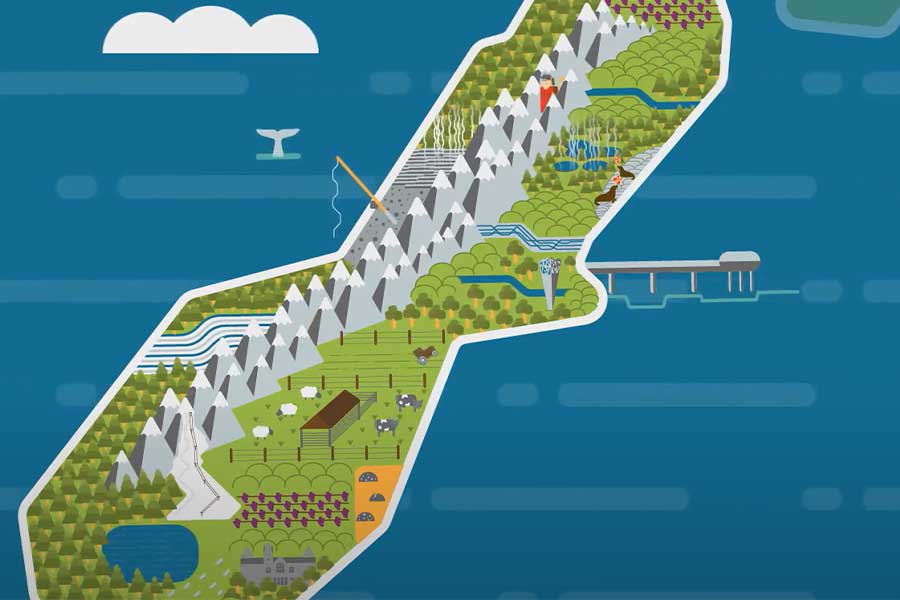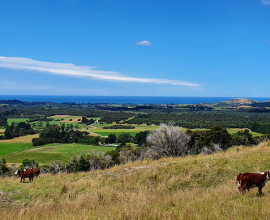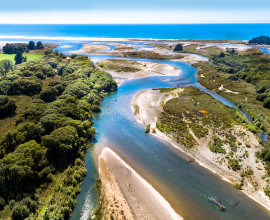Banks Peninsula water zone committee
The Banks Peninsula water zone committee is a joint committee of Christchurch City Council and Environment Canterbury.
The committee's role is to work with the community to develop actions and tactics to deliver on the Canterbury Water Management Strategy.
It recommends these actions and tactics to various agencies for implementation.
How are zone committee members selected?
Water zone committee members are appointed after councils advertise for expressions of interest from the community.
Applicants are assessed on skills, expertise and experience, as well as their ability to work together to develop water management solutions to economic, social, cultural and environmental issues.
Each water zone committee has between seven and 10 members, including:
- An Environment Canterbury appointee
- A local territorial authority councillor
- A rūnanga appointee
- Between four and six local members nominated from the community who come from a variety of backgrounds and interests.
Members serve for three years, meeting every few weeks to gather information from stakeholders and the community to ensure all interests are represented.
View members
Learn more about the current community members, Rūnanga representatives, Council appointments and Environment Canterbury representative.
Community members
Gina Waibl - Chair
Gina is the current Chairperson of the Committee. She lives in Governors Bay and has a rural property at the head of Whakaraupō. Gina has professional engineering skills along with interests in water, environmental protection and restoration, and farming. She is also the Committee's representative on the Whaka Ōra Community Advisory Group, a community representative on Environment Canterbury Biosecurity Advisory Group and is a steering group member, newsletter editor and local coordinator for Predator Free Port Hills. Gina grew up in Governors Bay.
Trudi Bishop - Deputy Chair
Trudi is trained as a Climate Reality Leader under the Al Gore Climate Reality Training corp and has professional experience in marketing, education and behaviour change.
Trudi grew up in Ashburton, lives in Beckenham and spends a lot of her time recreating on Banks Peninsula.
George Howden
George is a third generation farmer in Port Levy. George's farm has a number of waterways and significant areas of native bush. George has also been a shepherd at large stations in Canterbury and the North Island. He has been part of Banks Peninsula Wools, Banks Peninsula Agronomy Group, the Banks Peninsula Collie Club and helps organise dog trials at the Little River show. George grew up Port Levy.
Ben Manson
Ben Manson farms his own property in Little River and farms in partnership on 2 other properties (Ōnuku and Ōnuku Heights).
He has lived in the area for the past 35 years and his parents and grandparents for most of their lives.
Ben has been involved in the local community with the activities of the Little River School and Co-Chair of the Little River Flood Working Group.
Elisa Knight
Elisa has a range of experience in environmental management focusing on community and stakeholder engagement and assisting with change management to achieve improved environmental outcomes.
This includes experience in the UK supporting community flood response, and a regional compliance role at Environment Canterbury. She is based in Cashmere and has a property in Wainui, reflecting her passion for Banks Peninsula.
Andrea Davis
Andrea has an undergraduate degree in Anthropology, as well as completing a Masters of Landscape Architecture, with a focus on the Avonside Residential Red Zone. Andrea has been designing landscapes since 1985 and has lived in Christchurch for 32 years. Andrea also has connections to Kaikōura, Selwyn and Banks Peninsula zones, and is a keen river kayaker.
Victoria (Tori) Peden
Bio to come.
Erana Riddell - Youth Representative
Erana is a student at University of Canterbury and a member of the Environment Canterbury Youth Rōpū. She is a youth representative on the Water Zone Committee, so she can be part of the conversation.
"I want to, through my experience, normalise open communication between youth and more knowledgeable people who are experts in certain levels of fields. By allowing me to get involved I can then take my knowledge base that I learn whilst taking part and address it to the wider communities that I am part of, diversifying opinions shared and explained."
Rūnanga representatives
- Jaleesa Panirau - Wairewa Rūnanga
- Amber Moke – Te Hapū o Ngāti Wheke
- Vacant - Te Rūnanga o Koukourarata
- Rik Tainui - Ōnuku Rūnanga
Christchurch City Council appointment
- Cr Tyrone Fields
Environment Canterbury appointment
- Cr Paul Dietsche
Zone committee key resources
Download key documents developed by the committee, and view meeting minutes, agendas and presentations:
- Banks Peninsula Water Zone Committee Action Plan 2021–2024
- Banks Peninsula Water Zone Progress Reports
- View the Banks Peninsula Water Zone Terms of Reference and Code of Conduct
- View presentations to the Banks Peninsula Water Zone Committee
- View agendas and meeting papers for the Banks Peninsula Water Zone Committee
- Banks Peninsula Compliance and Incident Report update 2020/21 (PDF File, 134KB)
- Banks Peninsula Zone Work Programme progress 2018/19 (PDF File, 4.02MB)
- Banks Peninsula Water Zone Committee Implementation Programme (PDF File, 29.2MB)
- Banks Peninsula Water Zone Committee Implementation Programme addendum (PDF File, 1.87MB)
Zone committee recommendations
The Banks Peninsula Water Zone Committee has developed a package of recommendations called a Zone Implementation Programme Addendum (ZIPA), for regulatory and non-statutory actions to improve water quality and quantity, as well as biodiversity and tāngata whenua values in the zone.
- Banks Peninsula Water Zone Committee Implementation Programme (PDF File, 29.2MB)
- Banks Peninsula Water Zone Committee Implementation Programme addendum (PDF File, 1.87MB)



